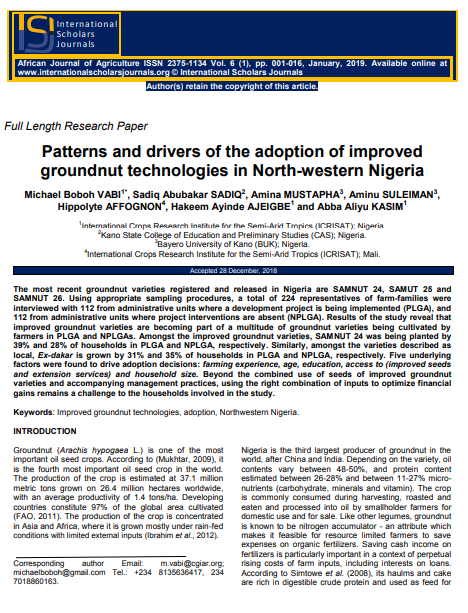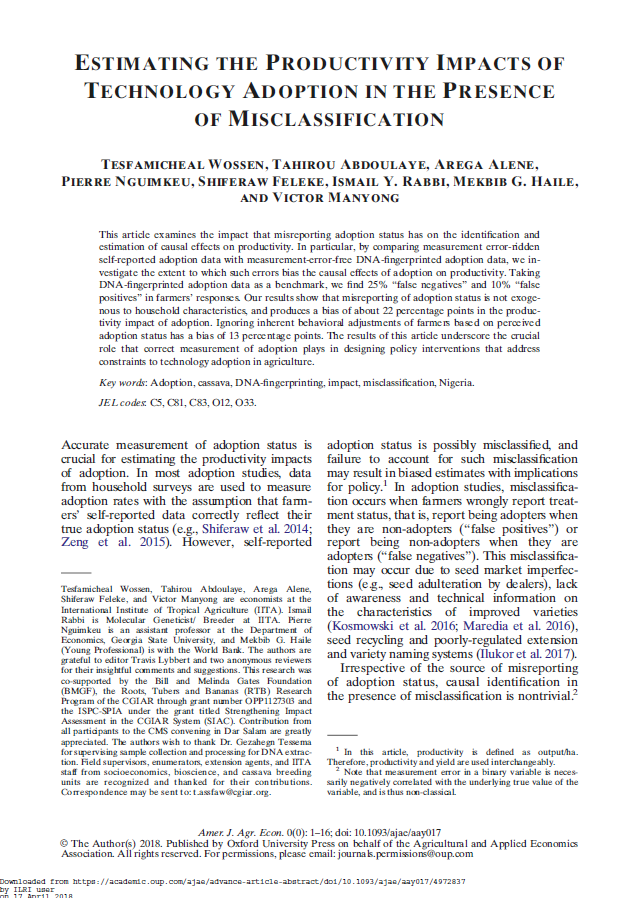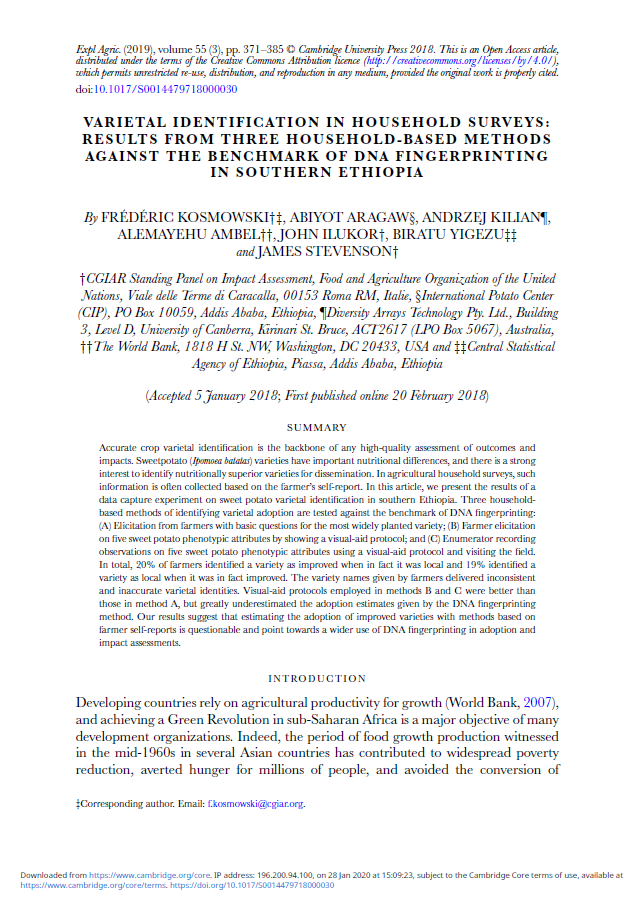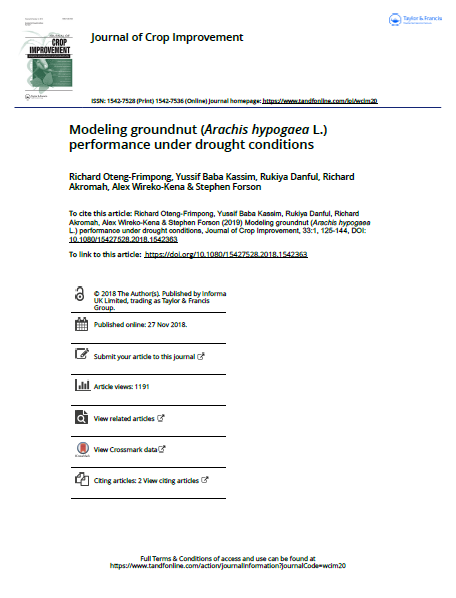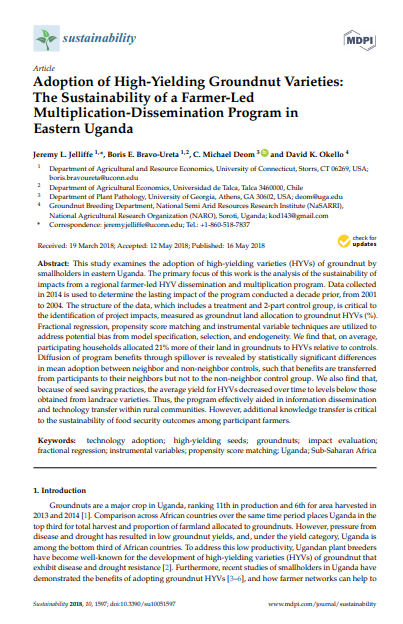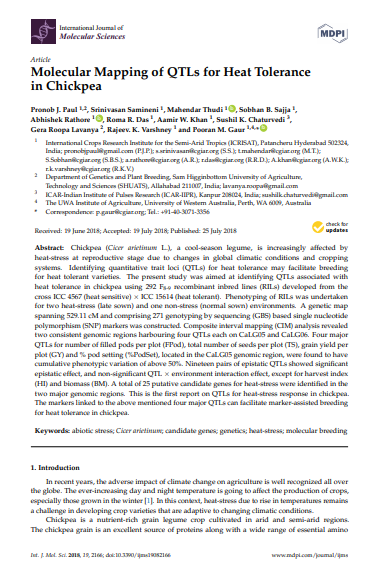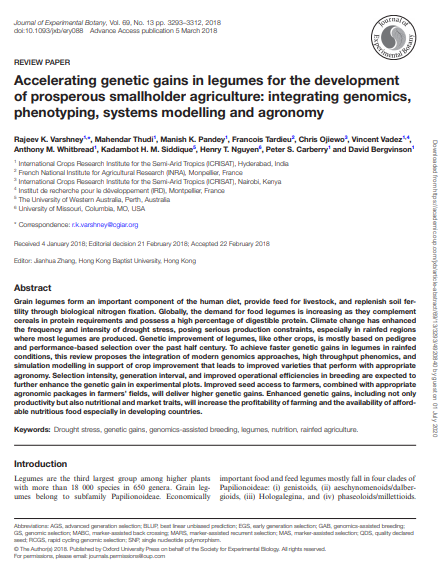Marching towards self-sufficiency in chickpea
A review of chickpea research in India during the last five decades and future research priorities to tackle newer challenges, as India aims to attain self-sufficiency in pulse production by 2050.
Project: TLIII
File type: PDF (355.65 KB)
Patterns and drivers of the adoption of improved groundnut technologies in North-western Nigeria
This article presents the results of interviews with farm families to assess the extent to which improved groundnut varieties are being adopted in northwestern Nigeria.
Project: TLIII
File type: PDF (518.24 KB)
Estimating the Productivity Impacts of Technology Adoption in the Presence of Misclassification
This article examines the impact that misreporting adoption status has on the identification and estimation of causal effects on productivity.
Project: TLII, TLIII
File type: PDF (334.95 KB)
Varietal Identification in Household Surveys: Results from Three Household-based Methods Against the Benchmark of DNA Fingerprinting in Southern Ethiopia
This article presents the results of a data capture experiment on sweet potato varietal identification in southern Ethiopia. The results point towards a wider use of DNA fingerprinting in adoption and impact assessments.
Project: TLII, TLIII
File type: PDF (364.31 KB)
Modeling groundnut (Arachis hypogaea L.) performance under drought conditions
Erratic rainfall is often a limiting factor in the semi-arid regions where most groundnut cultivation occurs. Ensuring availability of cultivars that possess inherent tolerance to drought stress has become a priority. Field and box experiments were conducted under drought and non-drought conditions to identify physiological and agronomic traits correlated with pod yield.
Project: TLIII
File type: PDF (2.58 MB)
Adoption of high-yielding groundnut varieties: the sustainability of a farmer-led multiplication-dissemination program in Eastern Uganda
This study examines the adoption of high-yielding varieties (HYVs) of groundnut by smallholders in eastern Uganda. The primary focus of this work is the analysis of the sustainability of impacts from a regional farmer-led HYV dissemination and multiplication program
Project: TLIII
File type: PDF (672.30 KB)
Groundnut production constraints, farming systems, and farmer-preferred traits in Tanzania
The objective of this study was to document groundnut farmers’ major production constraints, farming systems, and varietal trait preferences in selected agro-ecologies of Tanzania.
Project: TLIII
File type: PDF
Molecular mapping of QTLs for heat tolerance in chickpea
The present study aimed to identify QTLs associated with heat tolerance in chickpea using 292 F8-9 recombinant inbred lines (RILs) developed from the cross ICC 4567 (heat sensitive) × ICC 15614 (heat tolerant).
Project: TLIII
File type: PDF (2.03 MB)
Capturing genetic variability and selection of traits for heat tolerance in a chickpea recombinant inbred line (RIL) population under field conditions
To assess the genetic variability and identify heat responsive traits in chickpea, a set of 296 F8–9 recombinant inbred lines (RILs) of the cross ICC 4567 (heat sensitive) × ICC 15614 (heat tolerant) was evaluated under field conditions at ICRISAT, Patancheru, India.
Project: TLIII
File type: PDF
Accelerating genetic gains in legumes for the development of prosperous smallholder agriculture: integrating genomics, phenotyping, systems modelling and agronomy
To achieve faster genetic gains in legumes in rainfed conditions, this review proposes the integration of modern genomics approaches, high throughput phenomics, and simulation modelling to support crop improvement that leads to improved varieties that perform with the appropriate agronomy.
Project: TLIII
File type: PDF (1.04 MB)



